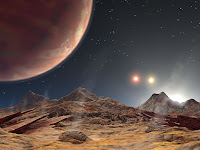“It does not matter how good your theory is, but if it does not agree with experiments, it is wrong. According to experiments all our theories are wrong. All of them. All of the physics of the last 60 years is wrong. Science is broken.”
A character in the series Three-Body Problem, streaming on Netflix, says this in the first episode. The point about science being broken that he is making is correct in my philosophical opinion.
Science faces the same problem that philosophy does. Neither is capable of leading to the ultimate truth. Every philosophical argument has a counter argument, and every scientific discovery or theory gets overturned at some point of time. Even Newton’s three laws have been challenged by the emergence of quantum science and the theory of relativity.
Three-Body Problem is based on a three book series by the Chinese science fiction writer Liu Cixin. The title of the first book in the series is Three-Body Problem. It is worth noting that the three-body problem is a real problem in science—it deals with the issue of predicting the motion and position of three heavenly bodies that are moving around each other in space.
Cixin introduces in his novel a planet called Trisolaris, located in the triple star system of Alpha Centauri. Being located in a triple star system, Trisolaris faces the three-body problem and has extreme weather patterns. When it is close to all three stars it is a blazing inferno and when it is at the farthest point from the three stars, it has an ice age.
Despite such extreme weather conditions, the planet is home to intelligent creatures who have built an advanced civilization. They are like humans but have the capacity to survive in extreme weather by dehydrating and transforming into flat parchment-like things which can be folded and stored in a safe place. When the weather becomes better, these parchments are thrown into a pond to get rehydrated and come to life.
The inhabitants of Trisolaris want to move to some other planet linked to a single star or sun where the weather is stable. Earth would be most suited for them. Only reason they have not invaded earth to exterminate humanity and other creatures and make the planet their new home is because they don’t know about this planet.
This changes in the 20th century, when a talented Chinese scientist becomes disgusted by the chaos on earth and loses faith in humanity. One day when this scientist is feeling deeply depressed she beams this message into space: “Come. We can’t save ourselves. I will help you conquer the world.”
Thus, the inhabitants of Trisolaris come to know of earth's existence. They start preparing for an invasion.
A mysterious video game headwear becomes available to scientists in Oxford. On wearing the video game headwear the scientist is transported to Trisolaris and is given the task of solving the three-body problem—predicting the movement of the planet and the three stars. There is no easy answer to the three-body problem.
There is mind-bending suspense as scientists scramble to save earth from an alien invasion.
(This short note is based on the first two episodes of the series on Netflix. There are 8 episodes in season one. I might come back with more after I watch the next 6 episodes.)




